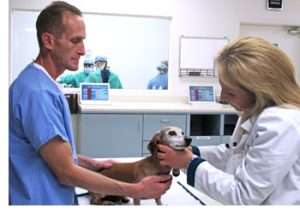
Consultation
The primary care veterinarian may contact a doctor at the Veterinary Neurological Center to discuss diagnosis and treatment of patients with neurological disorders. The veterinarian may decide to treat the patient on-site or refer to the VNC.
Referring a Patient
The primary care veterinarian may recommend (with or without consultation from a VNC neurologist) that the client bring their pet to the VNC for an examination by a neurologist. The referring doctor can use the online Referral Form to transmit client/patient information (including imaging studies) or the form can be downloaded and sent via fax. Prior to the appointment, the referring clinic should also fax or email the medical history of the patient and give any hard copies (including imaging studies that are on film or CD) to the owners to bring to their appointment.
Scheduling an Appointment
Once the owner has received verbal authorization from their primary care veterinarian to come to the VNC, the owner will contact us to schedule an appointment. In the event that diagnostic procedures are recommended, pets should be fasted for 12 hours prior to the appointment (when possible) to avoid alterations in blood samples (e.g. lipemia) and anesthetic complications due to nausea, vomiting or aspiration of food. Small amounts of water may be provided to avoid dehydration. If your pet is diabetic, consult your veterinarian about feeding prior to the appointment. Your referring veterinarian should advise you as to whether or not you should continue giving any current medications.
Patient Registration
The owner will fill out the Patient Registration Form. This form can be completed:
- online,
- by printing it, writing in the information and bringing it to the appointment or
- in the office prior to the appointment.
Owners should also bring medication(s) and hard copies (including imaging studies that are on film or CD) to the appointment.
Examination
The VNC doctor will meet with the owner and discuss the patient’s history and signs. The doctor will conduct a thorough physical and neurological examination. Based on their findings, the neurologist will be able to determine what part of the nervous system is most likely being affected, localize the problem to a specific region of the body and make a list of probable neurological disorders that may be causing the presenting signs.
Treatment Plan & Estimate
In order to effectively treat a specific neurological disorder, the neurologist may recommend diagnostic procedures to rule-out possible causes, localize the problem and confirm the cause of the disorder. At the time of the appointment, the owner will be given an estimate for services. If the owner agrees to proceed with this treatment plan, a 50% deposit payment will be required before proceeding with the procedure(s). The Veterinary Neurological Center accepts several different forms of payment: Visa, Mastercard, Discover, American Express, Care Credit, check (in-state), money order or cashier’s check, and cash.
Diagnostic Procedures
Some diagnostic procedures may only require a brief period of time to complete and the owner may wait at the clinic until the testing is finished. Others procedures may require that the patient stay for the entire day or overnight, in which case the owner will pick up their pet at a scheduled time.
Hospitalization
Patients who are severely ill or are recovering from surgery require constant care and monitoring by the neurologists and technicians. Hospitalization is often necessary to effectively treat and assist patients recovering from a neurological disease.
Going Home
Once the neurologist and client agree that effective recovery can be maintained by the owner, the patient will go home. At the time of discharge, the owner will receive a Discharge Summary from the neurologist. It details the patient’s problem, what procedures were performed, the diagnosis, and current and future treatment that might be required. The owner may also receive medications and pay the balance of their bill at this time. All bills should be paid in full prior to the patient’s discharge.
Referral Summary
The neurologist will fax or email the patient’s Referral Summary to the referring veterinarian. The referring doctor may choose the method for receiving such correspondence by submitting the Veterinarian Correspondence Form online.
Follow Up
After the appointment or treatment, the neurologist may suggest that the owner bring the patient back to remove sutures and/or to recheck the patient. Owners may call when they have questions or concerns regarding the neurological status of their pet. Although the neurologist at times may be unavailable to speak directly with the client, the experienced front office client service representatives will relay medical questions to the neurologist and promptly provide the owner with the doctor’s response.
